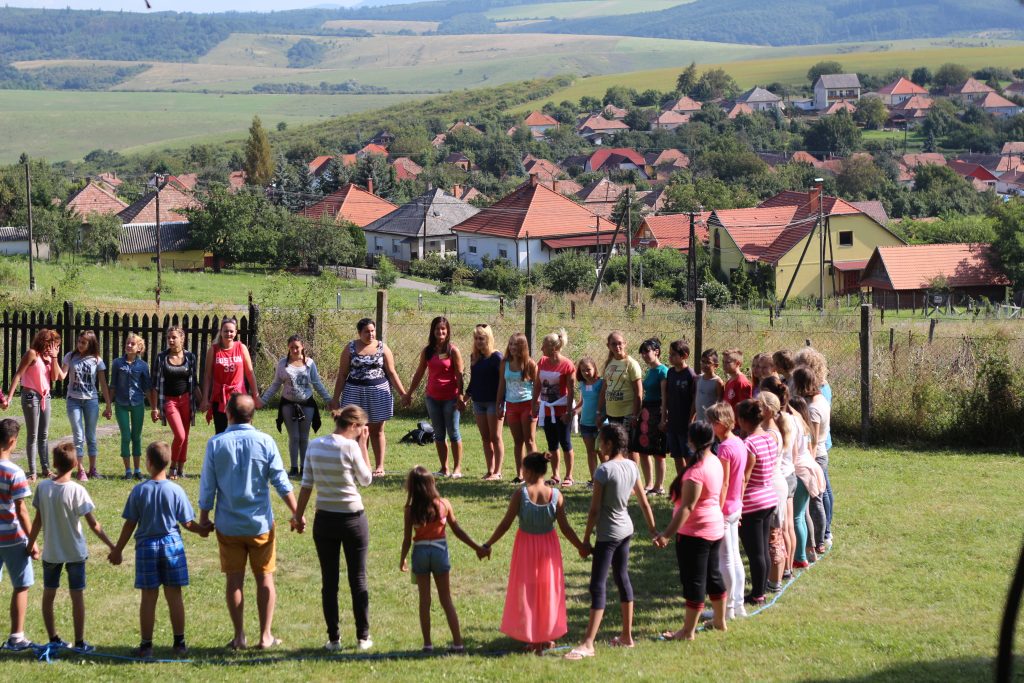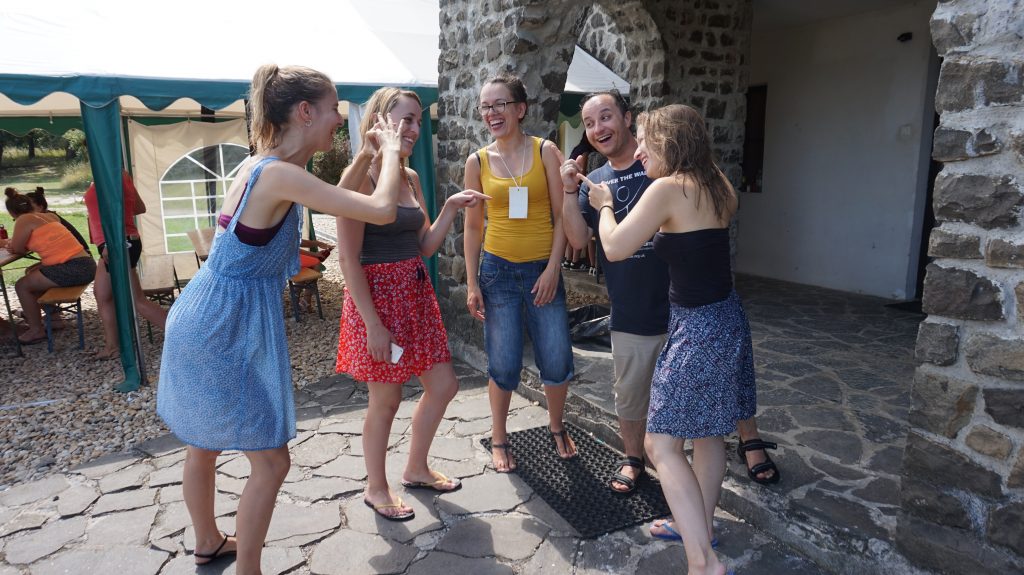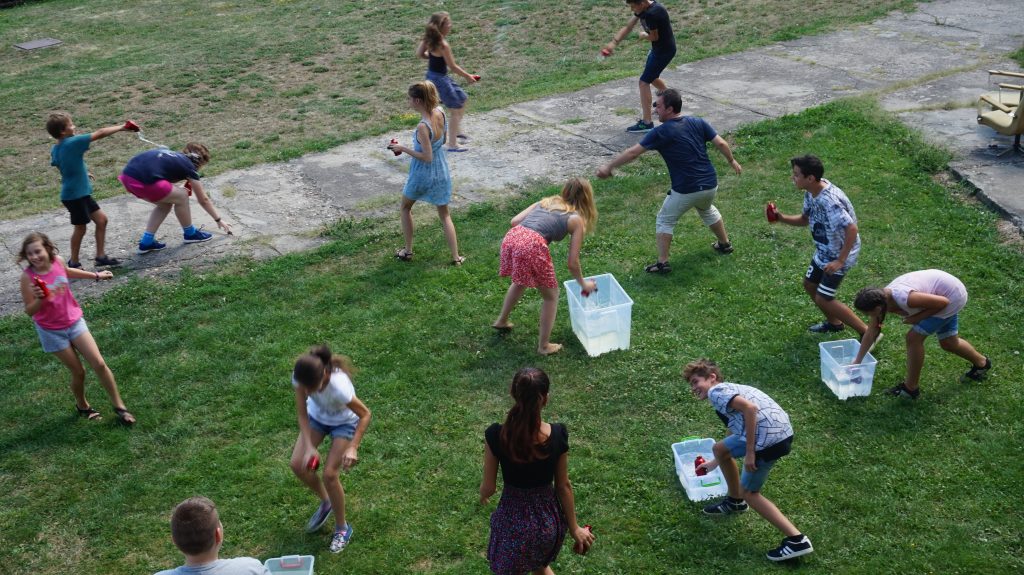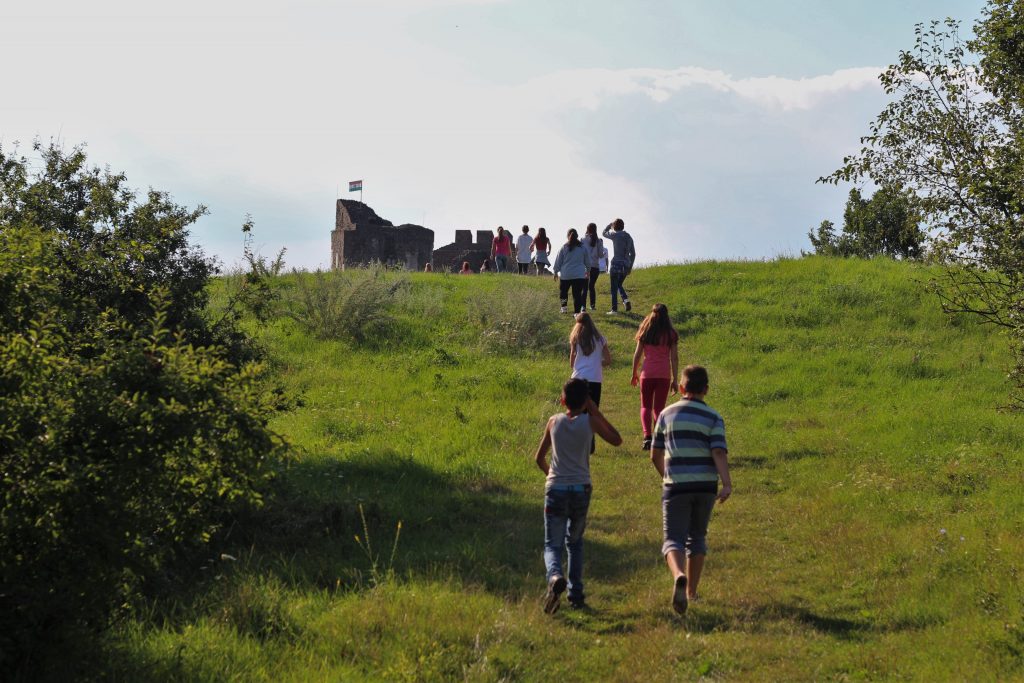Open doors and superheroes in Hollókő
“The Dancing on the Square camp has opened my mind,” said one participant after the camp.
This summer, for the second time, we had the opportunity to organise a summer camp for children participating in the Dancing on the Square project and their teachers. While we do have some expertise in organising camps and transporting children, these camps always still fill us with a sense of excitement and expectation.

We wondered if we would be able to provide participants with the kind of experience that would be a worthy continuation of their involvement at Heroes’ Square and their months of hard work getting ready for that performance. Following the success of the 4-day camp we hosted last summer, we also wondered if we would be able to offer something novel, exciting and also an experience for those who are returning participants, while also being educational. Oh, and of course it was to involve music! The staff of the Foundation for Democratic Youth (DIA) is well known for their creativity and their ability to cope with challenges. Still, this was an exciting situation even for them.
We looked at what made last year’s camp so good: at what we should be keeping and what new elements we should be incorporating.
What worked well last year:
- establishing and adopting rules shared by all
- creating and sustaining an atmosphere of mutual trust
- mutual respect
- the peaceful resolution of conflicts
- plenty of exciting developmental games and activities
- personal attention
- plenty of music and plenty of physical activity
We retained each of these elements, but structured the entire camp around the theme of “superpowers”. Why, you ask? Because the camp hosted children of highly diverse backgrounds, coming together from very different places. Many of them lack self-confidence; many of them may not be particularly successful in school; and many may not be aware of their own skills, abilities and opportunities. While we are well aware that four days is too short a time to overcome all of the disadvantages that these children may have accumulated, it is still enough to provide an experience that can serve as momentum for teachers and children alike. We therefore chose to focus on superpowers and on helping each participant – children and the accompanying teachers alike – to explore their own superpowers as well as those of others, and to consciously learn to master them.

We therefore had to create an environment, and do so quickly, where this process of exploration may take place. What did this require?
- an incredibly enthusiastic, committed and creative team
- a long and thorough planning process
- plenty of previous experience
- plenty of developmental games and activities
- a flexible venue
- rules established and respected by all
- open-minded children and teachers
- constant reflection
So what ultimately happened? Well, actually, nothing all that special, just a minor miracle which involved 45 children and 10 adults, who together were very quickly able to become attuned to one another and to create, play, think, explore, make friends, and get to know one another. There were team games, debates, coconut-chocolate dessert sessions, missions impossible and plenty of challenges. And of course, plenty of music, provided by Lasho Drom, the Melodika Project, young musicians of the Snétberger Centre, and Edina Balog. The singing dog – a portable amplifier – of the Festival Orchestra was another key character, which various enthusiastic members of the ensemble would tow behind themselves while playing excerpts from classical pieces, inviting participants to join the activities. Another uplifting experience was when two members of the DIA team, Andi (our financial specialist) and Balázs (who was completing his professional internship with us) played the guitar together for the children by the virtual campfire. The drought made it impossible to light a proper fire, so we ended up projecting a neat campfire on the wall indoors, lighting a number of candles and playing music and singing into the wee hours.
The highpoint of one of the camps was when the children themselves proposed hosting a talent show, which they then proceeded to organise. Three teams took part, and at the end of the show, one particular little girl got up on stage to dance. In the preceding 3 days she was unwilling to join any activity and did all she could to get us to send her home. But we did not. Her performance, however, was well-deserving of the heartfelt applause it received.

Another highpoint was when the Lasho Drom group held a sensitivity training session for participants before their concert one evening, just as the sun was setting. They discussed what it is like to be Roma in today’s Hungary; the prejudices and false beliefs surrounding the Roma; what makes the music they play exciting; and what coexistence is really like.
We should also mention, of course, that the heat wave was unbearable even there, in the Hollókő hills, and was compounded by the happy sounds of frolicking in the water at the imposing wellness centre that had been built in the vicinity. But we let nothing get in our way, and got hold of some water guns and organised an impromptu water fight.
So what was it about open doors? Well, the main gate of the camp on the hillside was open the entire day. We only closed it at night. But not one person walked out that gate. Everyone respected the common rules. Of course, one of the greatest tests of strength was the expedition to the village the teams had to organise. This meant that they were, actually, able to leave the camp on their quest to find crucially important pieces of information such as the name of the cashier in the shop; the largest livestock in the village; the oldest building; and the type of musical instrument housed in the church. Scoring was based primarily on the creativity of the team and how much effort they put into their expedition. It was fantastic to listen to their enthused accounts of how they sang songs to get Aunt Rózsi to come outside while making pork chops, how they supported their teammates wilting in the 40 degree heat, and how they found the BFO pins hidden around the campsite.
We are proud of how it was not just the children who would gladly have stayed on, but also the adults escorting them, who volunteered their free time and summer vacation to accompany the children to the camp. It is important to note that their group included preschool educators, primary and secondary school teachers, dormitory teachers, dance instructors, after-school mentors and a volunteer helper whose day job is as a pharmacist.

One of the key objectives of the Dancing on the Square project is to bring children of various backgrounds together and share with them the joy of creating together. This is something we were able to reinforce quite a bit in the camps, and we were also able to provide inspiration to the accompanying teachers to continue their work. We agree with Iván Fischer: it is through projects like these that the world becomes a better place, little by little. We are happy to have had the opportunity to be a part of this adventure.
Rita Galambos, Director, Foundation For Democratic Youth